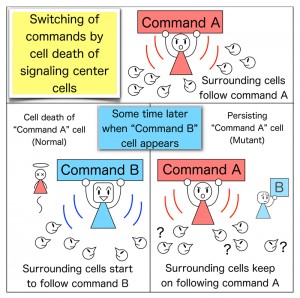Scheduled elimination of signaling centers Apoptosis at proper timing is crucial for brain development

It is known that many cells in our brains die in the course of fetal development. If this cell death does not take place properly, it can bring about a range of developmental abnormalities, such as exencephalia in which the brain protrudes outside the skull. However, many aspects of this process, such as why cells have to die, remain unknown.
Project Researcher Keiko Nonomura, Assistant Professor Yoshifumi Yamaguchi, and Professor Masayuki Miura at the Department of Genetics at the University of Tokyo Graduate School of Pharmaceutical Sciences have shown through detailed analysis of the mouse fetal brain that when the rapid elimination of cells through apoptosis, a form of cell death, does not take place properly, abnormalities of brain morphology occur as a result of the failure of neural tube closure. This information may be of use in understanding the pathogenesis of congenital diseases such as neural tube defects. Further, it was found that signaling centers, particular groups of cells that function as control towers during brain formation, are eliminated promptly and at the right timing by apoptosis. These signaling center cells secrete a signal protein command that affects the proliferation and differentiation of many neighboring cells. However, the commands required for morphogenesis change over time. This research has shown that apoptosis is useful as a mechanism for regulating the number of signaling cells or eliminating them entirely in normal brain development.
Whether apoptosis also functions in the same way as a mechanism for the rapid regulation of the number of signaling centers that issue commands during morphogenesis of humans and other animals is an important topic for future research into understanding how bodies develop and are maintained. Elucidating this mechanism may lead to an understanding of the pathogenesis of congenital developmental abnormalities of the brain and spinal cord.
Press release (Japanese)
Paper
Keiko Nonomura, Yoshifumi Yamaguchi, Misato Hamachi, Masato Koike, Yasuo Uchiyama, Kenichi Nakazato, Atsushi Mochizuki, Asako Sakaue-Sawano, Atsushi Miyawaki, Hiroki Yoshida, Keisuke Kuida, Masayuki Miura,
“Local apoptosis modulates early mammalian brain development through the elimination of morphogen-producing cells”,
Developmental Cell Volume 27, 2013, Issue 6, 621-634. Online Edition: 2013/12/23,
doi: 10.1016/j.devcel.2013.11.015.
Article link
Links
Graduate School of Pharmaceutical Sciences
Department of Genetics, Graduate School of Pharmaceutical Sciences








